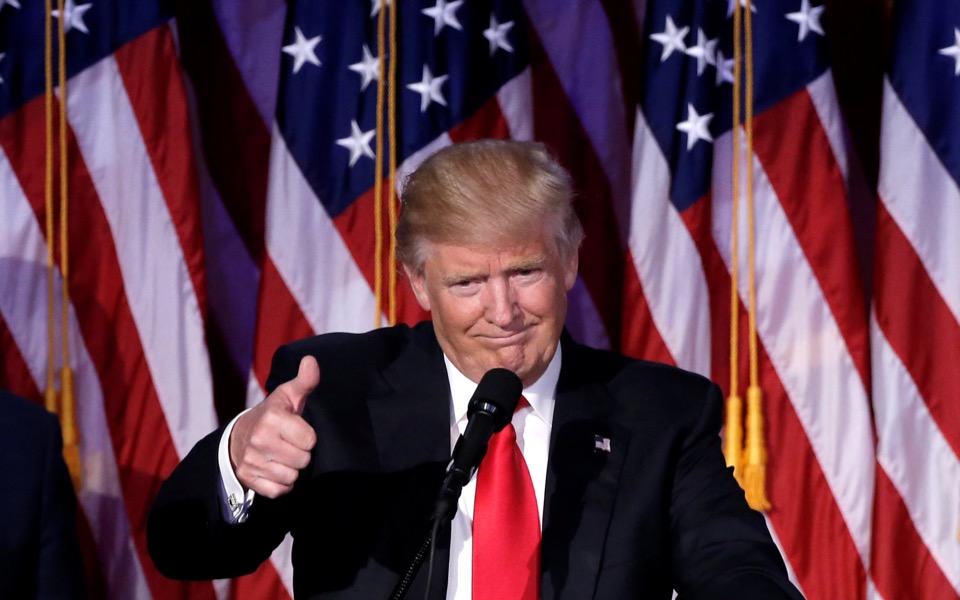Europe in the Age of Trump

The election of Donald Trump to top job in the US was a slap across the face of professional politicians, pollsters, the media, gender equality, established etiquette and the campaigning rules and niceties of the post-WWII liberal order. It is a reminder too, that the shock waves of the 2007 financial crisis are still influencing events, almost a decade down the line.
The day that America’s European allies hoped would never come is here. The elevation of Trump to the position of president elect has made the world a less stable and more uncertain place. Until the full implications of his victory are absorbed and Republican foreign policy strategists codify US foreign policy, a la Trump, his election is likely to spark off a series of crises around the globe.
Europe is already dealing with the deep uncertainty generated by the Brexit vote in the UK. The European Union economy is not showing signs of improvement and many eurozone countries are languishing under interminable austerity. It is in this climate that the Italian referendum next month and the French and German elections in 2017 will take place. Trump will cast a shadow over these electoral contests. He has shown that unrestrained rhetoric, narcissism and attacks on the weakest sections of society can be the most profitable electioneering tools. The concern is that his victory may legitimize such tactics. Furthermore, such a political strategy indicates that, to many voters, narrow horizons, isolationism and protectionism are preferable to altruism, compassion and open-mindedness. Let us be under no illusions here, Trump’s victory is a triumph over social inclusion and economic and political liberalism – it is the revenge of a languishing petite bourgeoisie over the educated middle and upper middle classes.
European stability is likely to be tested by Trump’s attitude to NATO, a military alliance that only last summer he described as “obsolete.” From today, the European NATO allies would be wise to accept that the future of the alliance will be one of a state of flux. It is not so much that Trump will not wish to continue with a US engagement with NATO, but rather, as he put it: “You can’t forget the bills… They have an obligation to make payments. Many NATO nations are not making payments, are not making what they’re supposed to make.” Under President Trump the Europeans will have to pay their full due, around 2 percent of gross domestic product, for American protection. If they don’t want to rock NATO, they’d better start reviewing their defense budgets as soon as possible and step up their commitments. NATO Secretary-General Jens Stoltenberg will have to show himself to be equal to Manlio Brosio in diplomatic skills to prevent the US and the European NATO allies from rehashing the mutual recriminations not voiced since the mid-1960s over the Vietnam War. In the Trump era, NATO’s Article 5, activated in the event of an attack on a member-state, may be less automatic than it was thought to be.
Russian President Vladimir Putin appears to be one of the few leaders genuinely pleased with the result of the American presidential election and he has declared his willingness to restore Russo-American relations to a friendlier footing from their currently poor shape over the war in Syria. If one accepts Trump’s stated willingness to cooperate with Putin over Syria, then Europe is facing the specter of a Trump/Putin world in 2017. As America has now taken a more authoritarian turn, German Chancellor Angela Merkel’s message of congratulations to Trump was replete with subtext. She stressed to him that Germany’s close cooperation with the US would be dependent on commitments to democracy and to equality of rights for all. Merkel’s concerns over a Trump/Putin world stem not just from her problems with the populist and xenophobic Pegida Party in Germany, but also from Trump’s statement in a NYT interview that he may not be willing to provide military assistance to the Baltic countries – Estonia, Latvia, and Lithuania – if they come under threat. The interview brought to the surface concerns about regional instability and questions about NATO, especially since Estonia is one of the few European NATO member-states paying its full dues to the alliance.
More shocks to Europe may emerge as well if President Trump decides on an accommodation with Russia over Syria and also, if he acts on his publicly declared “number one priority” to “dismantle the disastrous deal with Iran.” The Middle East is on tenterhooks. War in Syria is destabilizing Turkey and Lebanon. Issues such as security, terrorism and the mass movement of populations dominate all debate on the region. The search for regional stability seems more forlorn than ever and Trump’s assurances that he has a secret plan to “knock the hell out of ISIS” do not lessen these insecurities.
An America First policy on environmental issues is certain to lead to a clash with European states. The Paris Treaty and its ambitious environmental security provisions, a centerpiece of President Obama’s legacy, are certain to be challenged by a die-hard climate change denier such as Trump.
At a moment when America needed someone like Teddy Roosevelt to steer it safely through an increasingly chaotic world replete with complex threats, Americans voted in The Donald. One thing is sure though, the US will be moving toward a major repositioning of its foreign policy. The blueprint is not clear right now and may not even exist apart from what is in Trump’s head. A lot will depend on his ability to lure back to his foreign policy team all those extremely capable Republican foreign policy experts who deserted him in droves in the runup to the election and who vowed never to work for him or with him. In the meantime, until the contours of Trump’s foreign policy are detailed clearly, the world, and Europe in particular, will exist in an uncertain and unstable environment.
* Effie Pedaliu is fellow at LSE IDEAS and specializes in international history.





